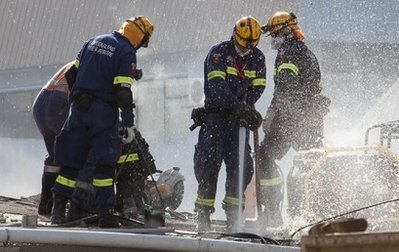'Dark days' in N.Zealand as earthquake kills 113
 |
| Rescue workers are seen digging at the site of the collapsed CTV building in quake-hit Christchurch on February 24, 2011.- source: AFP |
As rain hampered the painstaking search of Christchurch's devastated city centre, Foreign Minister Murray McCully admitted: "The rescue focus is drawing towards a conclusion."
"We're getting to the end of that period in which you can still have hope," McCully said.
No one has been found alive since the last of 70 survivors pulled from underneath rubble was rescued from a collapsed office building two days ago.
Police said 113 bodies were lying in a temporary morgue, while the latest number of missing was 228 after Tuesday's earthquake laid waste to central Christchurch and several suburbs in New Zealand's worst disaster in 80 years.
The city's iconic cathedral lost its spire, office blocks folded like packs of cards and entire streets lost their shop frontages in the shallow, 6.3-magnitude tremor, which came just months after a major 7.0 quake.
"These are very, very dark days for New Zealand," said Prime Minister John Key, holding out hope for "a bit of luck to try and find a few people that may still have survived this earthquake and are still trapped in those buildings".
Most of Christchurch, New Zealand's second biggest city, was left without power and water after the disaster, which prompted a mass exodus of terrified residents and left a damage bill estimated at NZ$10 billion (US$7.5 billion).
Police expressed disgust at an outbreak of looting and scams, with some people posing as officials to gain access to homes. In one case, burglars struck at the home of a woman missing in the quake.
"I am frankly sickened by people like this, who see this disaster as an opportunity to prey on vulnerable people," police superintendent Russell Gibson told Radio New Zealand.
District commander Dave Cliff said drunken disorder was also on the rise in the city, where stressed residents have endured the two major earthquakes along with thousands of aftershocks.
Rescuers have ruled out finding survivors at Christchurch's landmark cathedral, where up to 22 people could be buried.
Christchurch's Rugby World Cup stadium was closed Friday until March 15 to assess the extent of quake damage and determine if it could still host games during the tournament later this year, its operator Vbase said.
"We've got minor repairable structural damage, substantial damage to the surrounding streets and likely to services infrastructure," Vbase chief executive Bryan Pearson told AFP.
The arrival of Chinese and British rescuers swelled the multi-national effort to more than 600. However, rain and aftershocks made conditions tough and dangerous, with one fire official hit on his helmet by falling masonry.
Officials say 26 Chinese nationals are missing along with at least 26 Japanese, 12 Filipinos and a South Korean brother and sister. Two British nationals are among the dead.
With 90 percent of the city centre already combed, Civil Defence Minister John Carter said rescuers were now searching quieter areas like back alleys and lanes.
"They are now going into places such as alleyways where people would have been coming back and forward from work to go to lunch, where they suspect that there are people under the rubble of the facades," he said.
Christchurch mayor Bob Parker said the city should prepare itself for a sharp rise in the death toll.
"We have to steel ourselves for that count to rise substantially over the next 24 to 48 hours," he said. "It's not going to be pleasant news for people over the next couple of days."
What the stars mean:
★ Poor ★ ★ Promising ★★★ Good ★★★★ Very good ★★★★★ Exceptional
 Tag:
Tag:
Related Contents
Latest News
More News
- Russian President congratulates Vietnamese Party leader during phone talks (January 25, 2026 | 09:58)
- Worldwide congratulations underscore confidence in Vietnam’s 14th Party Congress (January 23, 2026 | 09:02)
- Political parties, organisations, int’l friends send congratulations to 14th National Party Congress (January 22, 2026 | 09:33)
- 14th National Party Congress: Japanese media highlight Vietnam’s growth targets (January 21, 2026 | 09:46)
- 14th National Party Congress: Driving force for Vietnam to continue renewal, innovation, breakthroughs (January 21, 2026 | 09:42)
- Vietnam remains spiritual support for progressive forces: Colombian party leader (January 21, 2026 | 08:00)
- Int'l media provides large coverage of 14th National Party Congress's first working day (January 20, 2026 | 09:09)
- Vietnamese firms win top honours at ASEAN Digital Awards (January 16, 2026 | 16:45)
- ASEAN Digital Ministers' Meeting opens in Hanoi (January 15, 2026 | 15:33)
- ASEAN economies move up the global chip value chain (December 09, 2025 | 13:32)






















 Mobile Version
Mobile Version